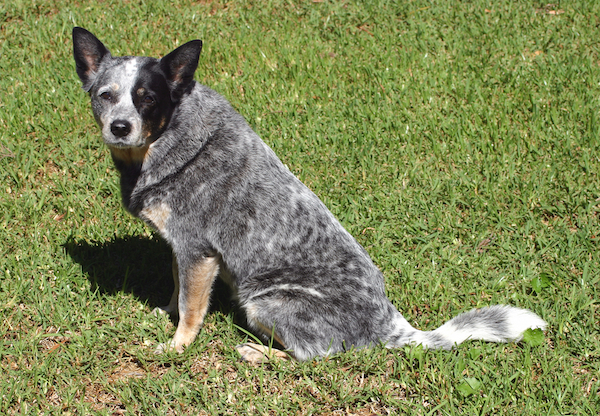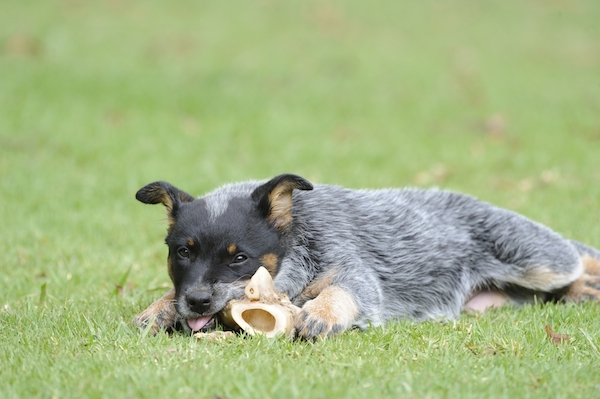The post Facts on the Blue Heeler Dog by Dogster HQ appeared first on Dogster. Copying over entire articles infringes on copyright laws. You may not be aware of it, but all of these articles were assigned, contracted and paid for, so they aren't considered public domain. However, we appreciate that you like the article and would love it if you continued sharing just the first paragraph of an article, then linking out to the rest of the piece on Dogster.com.
Proud parent of a Blue Heeler who’s looking to learn more or thinking about getting a Blue Heeler dog? Learn the facts about this dog here:
Quick Facts on the Blue Heeler:

Look at that gorgeous coat on this Blue Heeler. Photography by Sandra Caldwell / Shutterstock.
- Weight: 35 – 45 pounds
- Height: 17 – 20 inches
Blue Heelers (American Cattle Dogs) are solid, sturdy and compact dogs with an alert, ready-to-work stance. Slightly longer than tall with curved, hanging tails, they have muscular legs and strong necks and broad, somewhat rounded heads with pointy ears. Their dense, weather-resistant coats come blue, blue mottled, blue speckled or red speckled — both with possible dark or tan markings. The name Blue Heeler refers to the Australian Cattle Dog with the blue coat, while the red-coated Australian Cattle Dog is sometimes referred to as the Red Heeler.
Blue Heeler Traits:
- Intelligent
- Resourceful
- Active
- Alert
- Hard-working
- Protective
Ideal human companions — who gets along with Blue Heelers?

Active, sporty types get along with Blue Heeler dogs. Photography by WOLF AVNI / Shutterstock.
- Singles
- Active, sporty types
- Families
- Hunters
- Cattle breeders
What are Blue Heelers like to live with?
These are high-energy, clever and active dogs. Not content with sitting around the house for hours on end, Blue Heelers will encourage you to take them outside for exercise, play and work.
Blue Heelers, like most herders, can be one-person dogs. They also have a unique independence, not requiring much in the way of cuddling or affection. Though tough and resolute, they will definitely appreciate positive feedback and good treatment. Sometimes their herding instincts can suddenly come into play. They may “herd” family members or nip lightly at heels if they want something.
They don’t bark too much, but they are still very protective of the home. Blue Heelers can be cautious and wary — qualities that make them excellent guard dogs. They are also friendly and loving companions.
What you should know about Blue Heelers
Blue Heelers need activities, tasks and lots of room to run; therefore, they are probably not suited for apartment living. Without open spaces and jobs to do, they can get into mischief and destructiveness. Easily trained, they need a firm hand controlling them so that they don’t bond with another dominant dog in the neighborhood.
Some may have the urge to nip. A toy can solve this problem. Just be sure it’s a tough one: Blue Heelers can tear a typical dog toy to shreds in one sitting. Also remember: Keep your Blue Heeler on a leash. They are very curious and love to run and roam. Also, they can have issues with dogs they don’t know very well.
A healthy Blue Heeler can live as long as 15 years. Common health issues can include eye problems, hip dysplasia and deafness.
Blue Heeler history
Mixing native Dingoes with Collies and other herding dogs, Australian George Elliott developed the Australian Cattle Dog (the Blue Heeler) in 1840. Australian cattlemen and ranchers loved the breed’s toughness and work ethic, and the dogs quickly became popular as cattle herders. The American Kennel Club officially recognizes the breed name as the Australian Cattle Dog. The blue coat version is the one called Blue Heeler, which is more of a nickname than an official name. Australian Cattle Dogs are also called Australian Heelers or Queensland Heelers.
Tell us: Do you have a Blue Heeler? What attracted you to this type of dog?
Thumbnail: Photography by BGSmith / Shutterstock.
Read more about Blue Heelers on Dogster.com:
- Are Blue Heelers Really Blue?
- Get to Know Blue Heelers: Fiercely Independent Charmers
- Roses are Red — and Blue Heeler Puppies Are Awesome
The post Facts on the Blue Heeler Dog by Dogster HQ appeared first on Dogster. Copying over entire articles infringes on copyright laws. You may not be aware of it, but all of these articles were assigned, contracted and paid for, so they aren't considered public domain. However, we appreciate that you like the article and would love it if you continued sharing just the first paragraph of an article, then linking out to the rest of the piece on Dogster.com.
Poop4U Blog
via www.Poop4U.com
Dogster HQ, Khareem Sudlow


No comments: